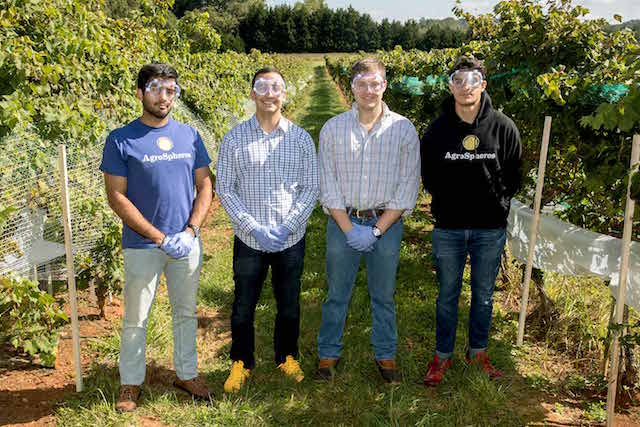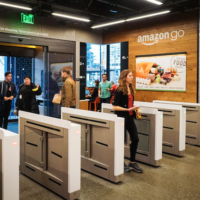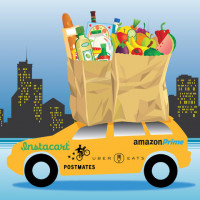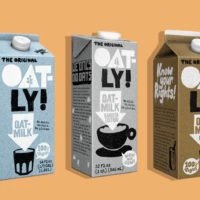
Our Millennial Innovators Series profiles the bright, creative and driven university-aged students from around the world that make up Thought For Food (TFF), the world’s leading organization for next generation innovation and collaboration to feed 9+ billion people by 2050. Throughout this series, we will highlight the work of the Finalist Teams of the 2016/17 TFF Challenge who are working to transform our food system.
Using pesticides can be a necessary, yet restrictive process for farmers. When using pesticides, crops cannot always be harvested at their peak due to required pre-harvest intervals (PHI), which is the time intervals between when crops are sprayed and when they picked to allow pesticide residues the necessary time to degrade. Moreover, pesticide use can also lead to significant public health costs, pesticide resistance management costs and crop loss costs.
AgroSpheres aims to solve these problems. Developed by University of Virginia students Zach Davis, Joseph Frank, Payam Pourtaheri, Ameer Shakeel and Sepher Zomorodi, AgroSpheres is an enzyme delivery system that allows farmers to degrade pesticides on their crops in a matter of hours instead of days. Soon the startup will also be able to protect crops from frost damage. AgroSpheres has completed 10 trials with vineyards in the US. In each trial, AgroSpheres technology degraded the pesticides in under three hours. Since 2014, it has raised $174,000 to date from a number of competitions and grants. Read our complete interview with AgroSpheres below.
______________________
Thought For Food: What inspired you to start AgroSpheres?
AgroSpheres: One of our co-founders, Ameer Shakeel, grew up in Pakistan, and spent much time on the farm lands of his relatives. He saw first-hand how the absence of pesticide regulation can impact food production, as food goes to waste when pesticide levels on produce are too high. He also witnessed the health impacts pesticide administration can pose to workers and consumers.
AgroSpheres was started as a means of working with a unique, powerful platform technology. We produced unique bioparticles by using biological and engineering applications on a safe, commonly-used microbe. These bioparticles can be used to perform all kinds of tasks, and we realized we could incorporate necessary enzymes on the bioparticles for the degradation of pesticides. Our technology is well suited to address a multitude of problems across many industries, but we were passionate about making a difference in food and agriculture.
TFF: What issue does AgroSpheres help solve and how?
AS: AgroSpheres helps to solve two issues. First, harvested produce that contains a high level of residual pesticides must be thrown away, wasting otherwise suitable food. While pesticide use accounts for large economic losses in other ways, according to Dr. David Pimentel of Cornell University there are actually $1.4 billion worth of losses in the US annually due to crop losses from pesticides. Additionally, pesticides pose a health risk to farm workers. Pesticide spray can also drift to unintended targets and can reach water sources, affecting consumers as well. Our solution offers a way to degrade pesticides that remain on harvested produce, keep farming workers safe, and removing pesticides from unintended targets like soil and water.
TFF: What is the biggest challenge you faced when developing AgroSpheres and how did you solve it?
AS: Our biggest challenge was taking our innovation from a lab setting to an agricultural setting. While we were able to show that our prototype successfully functioned in our lab experiments, we couldn’t know with 100 percent certainty what to expect when testing our innovation in farm fields. While we were confident in our work, the farm setting inherently holds more variables that are out of our control relative to the lab. To date, we have completed 10 trials at three vineyard locations in the US. We tested our product’s ability to degrade a commonly used organophosphate pesticide, Malathion. With several modifications and plenty of hard work, our product was able to function as we’d hoped, effectively degrading all pesticides on grapevines in under three hours!
TFF: Who are your target customers?
We are starting with vineyards and then branching out to various speciality crops. Our product will cost less per acre per year than the cost of pesticides. At this point in time, we need regulatory approval before farmers can use our technology, but we have Letters of Intent signed by a large number of the vineyards in the state of Virginia.
TFF: What are your plans for AgroSpheres in the near future?
AS: We were beyond humbled to return home with prize money from the TFF Global Summit. We are now beginning to pursue other methods of crop and food protection in addition to pesticide degradation. Our technology is unique and modular, and we believe that it can be useful in capacities outside of pesticide degradation in the agriculture industry. One of the areas we are working on now is preventing frost. We will continue to work on research and development to offer the agriculture industry as many solutions as possible to keeping our food safe, in addition to helping increasing crop yields that will help feed the globe.
TFF: What role do you see AgroSpheres playing in global food security?
AS: We see AgroSpheres being useful in several capacities relating to global food security. AgroSpheres’ product can be applied to crops that have been treated with pesticides immediately before harvest. This keeps farm workers safe when coming into contact with produce. Additionally, our product can be applied to produce when reaching the stores that will sell the crops, ensuring customers that their purchases are safe. Finally, consumers could also use our product in their home to ensure that their food is of utmost safety and quality. Ultimately, AgroSpheres will ensure that food is pesticide-residue free, in addition to helping save billions of dollars worth of food having to be thrown away due to residual pesticides.
TFF: What was your experience like as a TFF Finalist and how did that experience shape where AgroSpheres is today?
AS: Being a TFF Finalist was truly a once-in-a-lifetime experience for our team. The TFF group was tremendous in helping us focus and enhance our business plan for AgroSpheres. Additionally, being a TFF Finalist helped us learn how to best explain our invention, visions, and goals for AgroSpheres to audiences of all kinds, which for us was invaluable. But our biggest takeaway from this experience was the cultural element that TFF offers. Being a finalist allowed us to meet many people from all over the entire world, helping us to better understand the problems and feelings from areas outside of our home. The experience was something our team will never forget.
TFF: How much money have you raised to date?
We have raised $174,000 from competitions and grants including the UVA Entrepreneurship Cup, Virginia Velocity Tour, Collegiate Inventors Competition, Virginia Wine Board Grant, the ACC Inventure Prize, and Thought For Food.
TFF: If you could offer a piece of advice to entrepreneurs interested in developing food security solutions, what would it be?
AS: Our advice would be to think “weird,” not conventionally. We approached pesticide degradation as our team’s focus. There is currently no market for pesticide degradation products, but we felt that our idea was important enough to push forward. After learning how to best represent our innovation and goals, it became clear to us that others in the food security space found our work to be important and innovative. There is a multitude of innovations coming out of the agriculture industry, and being 1 degree different from other groups helps the industry to continue to grow and blossom. We believe this is the way food security will be accomplished on a global scale.
If your are interested in learning more about AgroSpheres, our current projects, and future visions, please feel free to email Payam Pourtaheri at Payam@agrospheres.com.
If you are interested in learning more about Thought For Food, check out www.tffchallenge.com





